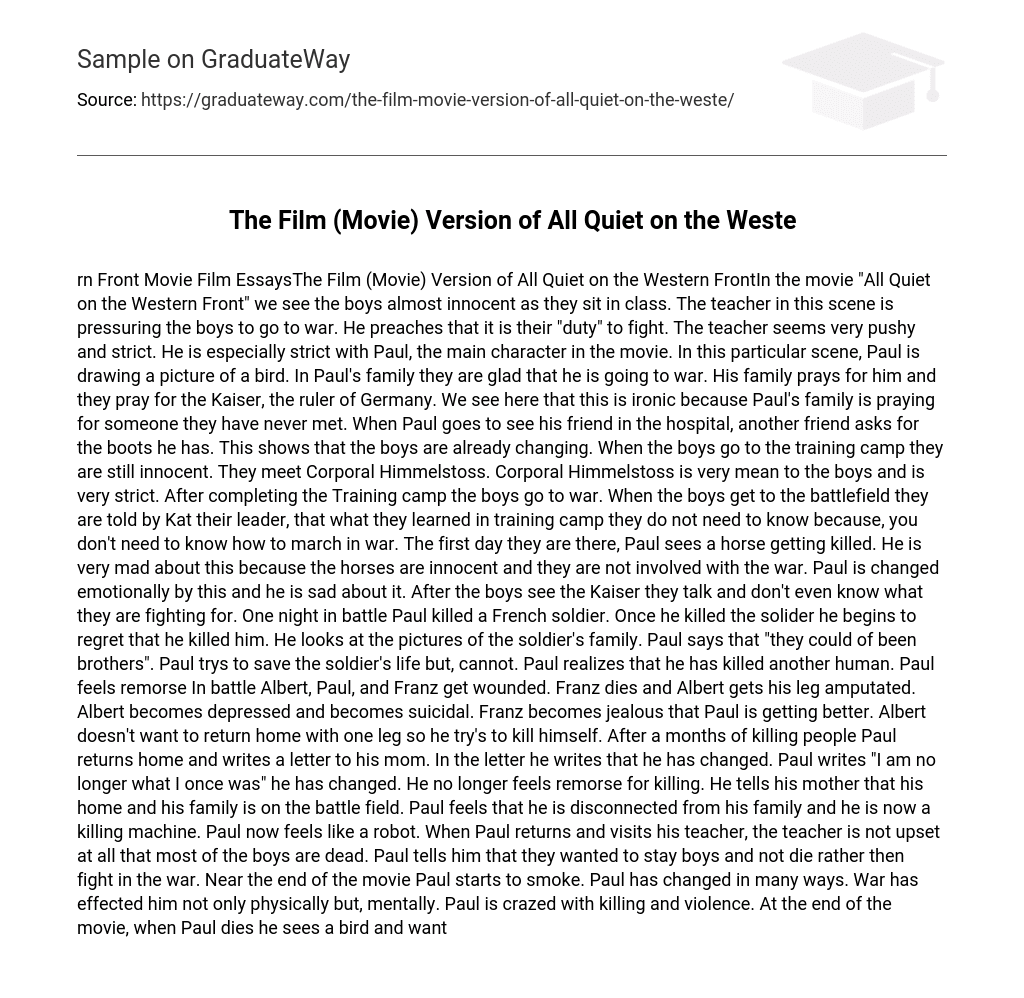The teacher, being very pushy and strict, pressures the boys to go to war and preaches about it being their “duty” to fight. Paul, the main character in the movie, is particularly subject to the teacher’s strictness.
In this particular scene, Paul is sketching an image of a bird, while his family expresses joy over his upcoming deployment to war. They not only pray for Paul’s safety but also pray for the Kaiser, the German ruler. The irony lies in the fact that Paul’s family is praying for someone they have never encountered. Additionally, when Paul visits his friend in the hospital, another comrade requests his boots, highlighting the evolving nature of the boys’ perspectives and attitudes.
When the boys attend the training camp, they are naïve and innocent. There, they encounter Corporal Himmelstoss who proves to be a cruel and stringent figure. Once they finish the training camp, the boys are deployed to the war front.
Upon their arrival at the battlefield, Kat, their leader, informs the boys that the knowledge they gained in training camp about marching is unnecessary since it has no relevance in war. On the inaugural day of their presence, Paul witnesses the killing of a horse, which infuriates him deeply as he recognizes the innocence of these creatures and their detachment from the war. This experience profoundly impacts Paul’s emotional state, leaving him saddened. Additionally, after encountering the Kaiser, the boys engage in conversation but remain unaware of the purpose for which they are fighting. Eventually, during one night of battle, Paul takes another soldier’s life, specifically a French soldier.
After taking the life of the soldier, the protagonist experiences immediate remorse. He takes a moment to reflect on the soldier’s family through the photos he finds. In this introspective moment, Paul laments that they could have been siblings. Despite his efforts to save the soldier, Paul is unable to do so, leading him to confront the harsh reality that he has taken another human life.
Paul experiences remorse during a battle in which he, Albert, and Franz all sustain injuries. Tragically, Franz loses his life and Albert undergoes a leg amputation, leading to his depression and suicidal thoughts. Albert becomes envious of Paul’s recovery. Fearing return home with a missing limb, Albert attempts to take his own life. Eventually, after months of being involved in violence, Paul finally comes back home and decides to write a letter to his mother.
In the letter, he expresses a transformation. Paul states, “I am no longer the person I used to be,” indicating his change. He now lacks remorse for taking lives and acknowledges that his true sense of belonging lies on the battlefield, away from home and family.
Paul expresses a sense of alienation from his family, transforming into a relentless killer and feeling comparable to a robot. Upon revisiting his teacher, Paul notices that the teacher shows no remorse for the deceased boys. Paul confides in the teacher, explaining that they desired to preserve their innocence and avoid perishing in the war. Towards the conclusion of the movie, Paul initiates smoking, reflecting his significant personal transformations.
War has impacted him both physically and mentally. Paul has become obsessed with murder and brutality. At the conclusion of the film, when Paul dies, he observes a bird and desires to sketch it. The bird may symbolize the contrast between Paul’s innocence when he initially drew a picture of it in the classroom and his current state of cynicism and rage, fueled by his involvement in killing.
It appears that the boys were compelled to participate in the war due to societal pressure, despite their youth.





